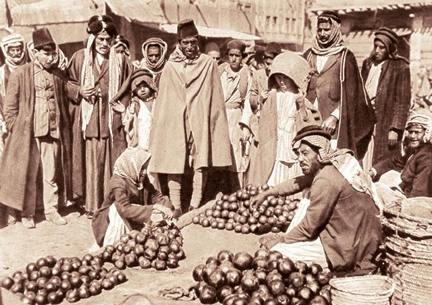
Fruit market in Baghdad, Photo by A. Kerim, 1925, published by the Hasso Brothers in Baghdad and printed by Rotophot A.G. in Berlin. Harvard Semitic Museum Photographic Archives, Virtual Baghdad Museum.

Fruit market in Baghdad, Photo by A. Kerim, 1925, published by the Hasso Brothers in Baghdad and printed by Rotophot A.G. in Berlin. Harvard Semitic Museum Photographic Archives, Virtual Baghdad Museum.
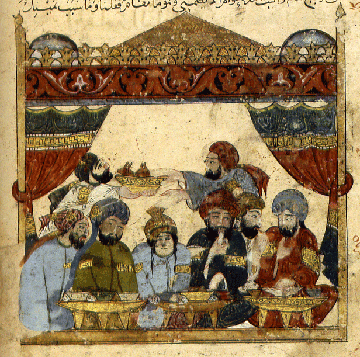
A host tending to the needs of his guests, Maqâmât al-Harîrî, 1236 CE
As richly illustrated in Geert Jan van Gelder’s delightul God’s Banquet: Food in Classical Arabic Literature (New York: Columbia University Press, 2000), Arab poets loved food and wrote extensively on the adab of cuisine. There are poems devoted to specific foods, but even a few recipes for the cook with a wit as well as a greasy thumb. Here is van Gelder’s translation of a recipe poem by the Baghdadi poet Kushajim (died 961 CE):
You have asked me about the best of dishes:
You’ve asked today someone who is not ignorant!
Now take, my friend, some ribs of meat,
And after that some meat of leg, and fat,
And chop some fat and succulent meat
And rinse it with sweet and clear water. Continue reading A Poet’s Recipe
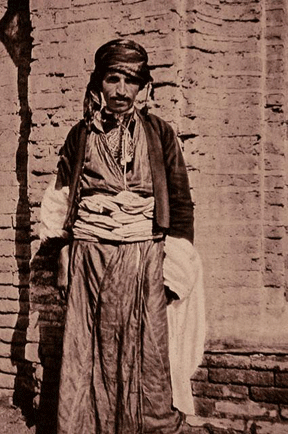
A Kurdish tribesman from southern Kurdistan, Photo by A. Kerim, 1925, published by the Hasso Brothers in Baghdad and printed by Rotophot A.G. in Berlin. Harvard Semitic Museum Photographic Archives, Virtual Baghdad Museum.
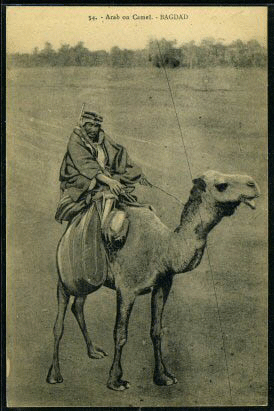
Here is a postcard from a century ago entitled “Arab on Camel … BAGDAD.” I guess for the postcard title writer, a camel rider outside the city of Baghdad might as well be down town. But one wonders why the title was even needed. Where else would the person receiving the postcard at the time have imagined an “Arab” would be?
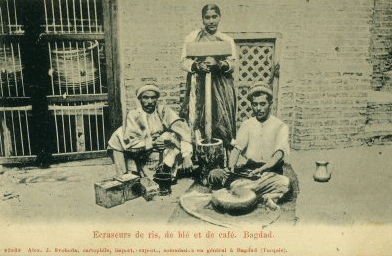
What’s in a photograph? This century old postcard depicts a scene in Baghdad with the emphasis on wooden utensils (ecrasseurs) for pounding rice, wheat and coffee.
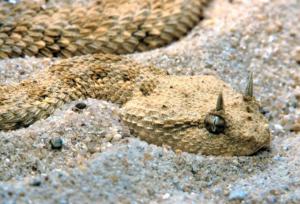
The Desert Horned Viper lurks in sand, only eyes, nostrils and horns above the surface.
Webshaykh’s Note: Cyberspace harbors a host of apocalyptic websites that relate current events in the Middle East to biblical prophecy. From the site Heaven Awaits it would seem that even Iraqi snakes are suspected of being terrorists… after all these snakes have horns. The following commentary stems from a news item in The Independent.
Snakes preparing the way for demons?
from Heaven Awaits website
The Desert Horned Viper lurks in sand, only eyes, nostrils and horns above the surface. Interesting ….that it has “horns.â€
The Bible predicts that the Euphrates River will dry up, and demons will come out. See the latest headlines from Iraq. Continue reading Even Iraqi Snakes are Terrorists
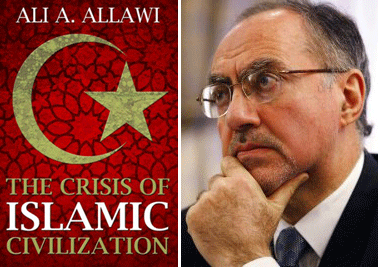
By Ali A. Allawi, The Chronicle Review, June 29
I was born into a mildly observant Muslim family in Iraq. At that time, the 1950s, secularism was ascendant among the political, cultural, and intellectual elites of the Middle East. It appeared to be only a matter of time before Islam would lose whatever hold it still had on the Muslim world. Even that term — “Muslim world” — was unusual, as Muslims were more likely to identify themselves by their national, ethnic, or ideological affinities than by their religion.
To an impressionable child, it was clear that society was decoupling from Islam. Though religion was a mandatory course in school, nobody taught us the rules of prayer or expected us to fast during Ramadan. We memorized the shorter verses of the Koran, but the holy book itself was kept on the shelf or in drawers, mostly unread. The elderly still made the pilgrimage to Mecca to atone for their transgressions in preparation for death — more an insurance policy than an act of piety. I don’t recall ever coming across the word “jihad” in a contemporary context. The political rhetoric of the day focused on Arab destiny and anti-imperialism. Continue reading Islamic Civilization in Peril

Interrogation Results Prompt Scrutiny Of Methods
by Dina Temple-Raston, NPR, Morning Edition, April 30, 2009
This is a story about two interrogation programs — one run by the U.S. military, the other run by the CIA. The military program was focused on getting important al-Qaida suspects in Iraq to talk. The CIA operation zeroed in on important al-Qaida suspects from around the world. Both programs had similar goals, but they operated under very difficult rules.
Earlier this month, former CIA Director Michael Hayden was on Fox News defending the CIA’s enhanced interrogation program.
“The use of these techniques against these terrorists made us safer,” he said emphatically. “It really did work.” As Hayden and others see it, the U.S. had to use tough techniques — some called it torture — to battle al-Qaida.
Matthew Alexander is an advocate of a different kind of interrogation — one that builds rapport, like the kind of technique you see on television cop shows. Alexander was a military interrogator in Iraq and doesn’t see the need for rough questioning. Continue reading Interrogating Interrogation in Iraq